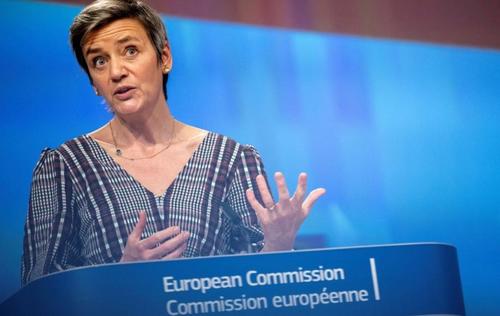EU Says Apple’s App Store Breaks Anti-Trust Rules As Court Showdown With Epic Games Looms
A long-awaited legal showdown between Apple and “Fortnite” maker Epic Games will start May 3, when a federal judge will hear arguments as Epic alleges that Apple’s control of the iOS app store, and the fees it charges developers, makes it an illegal monopoly, the EU’s anti-trust czar Margrethe Vestager (who has a reputation for attacking American tech giants on anti-trust grounds) has just launched a similar crusade of her own.
Via a charge sheet issued Friday, Vestager and the EU have determined that Apple is guilty of antitrust violations for allegedly abusing its control of its app store when it comes to music-streaming apps like Spotify, a European company that competes against Apple’s “Apple Music” with its popular music-and-podcast streaming app, and which complained to Vestager about Apple.
While that sounds reasonable at first brush, it’s worth noting the specific practice that Vestager finds offensive: And that’s Apple’s practice of charging commissions as high as 30% on some of its most popular apps. That’s virtually the same issue that Epic and Apple will be battling over.
“By setting strict rules on the App Store that disadvantage competing music streaming services, Apple deprives users of cheaper music streaming choices and distorts competition,” said Margrethe Vestager, who is in charge of competition enforcement at the European Commission.
Fortunately for Apple, the company will have a chance to argue its case before the European Commission hands down a final decision. However, if found guilty, Apple could face a fine of up to 10% of its annual revenue and be forced to adjust its business practices, though it can also appeal any decision in court.
Spotify isn’t the only company complaining to European regulators: Epic Games also lodged an antitrust complaint with the commission against Apple back in February on similar grounds.
“We will not stand idly by and allow Apple to use its platform dominance to control what should be a level digital playing field,” Epic founder and Chief Executive Tim Sweeney said at the time.
The US legal dispute started last summer when Epic sued Apple after Apple removed Fortnite from the App store over Epic’s decision to create an in-app workaround that allowed customers to circumvent Apple’s commissions, despite the company’s explicit threats that it would ban Fortnite if Epic tried to deprive Apple of what the company sees as hard-earned revenue.
The EU formally opened its app store case last year. The bloc is also probing Apple over its treatment of payment providers and app developers in its Apple Pay ecosystem, as well as its imposition of its in-app payments system for competing providers of e-books. The case deepens the EU’s long-running battle with Apple over tax and competition issues, which dates all the way back to when the bloc forced the company to pay back taxes to the Irish government.
As WSJ points out, at the core of the EU case against Apple is a question that is increasingly being asked by antitrust regulators and experts globally: What responsibilities should be placed on companies that serve millions of businesses and billions of consumers with services that many now consider “essential”.
In December, the EU also proposed a new bill that would impose new requirements on so-called gatekeeper businesses, defined as companies with high earnings and market capitalizations with more than 10,000 active business customers or 45 million active end users in the bloc.
The ramifications of this new law would be felt by Apple, Facebook, Amazon and Google, while few European firms would be impacted.
Tyler Durden
Fri, 04/30/2021 – 09:04
via ZeroHedge News https://ift.tt/3tb7C49 Tyler Durden
